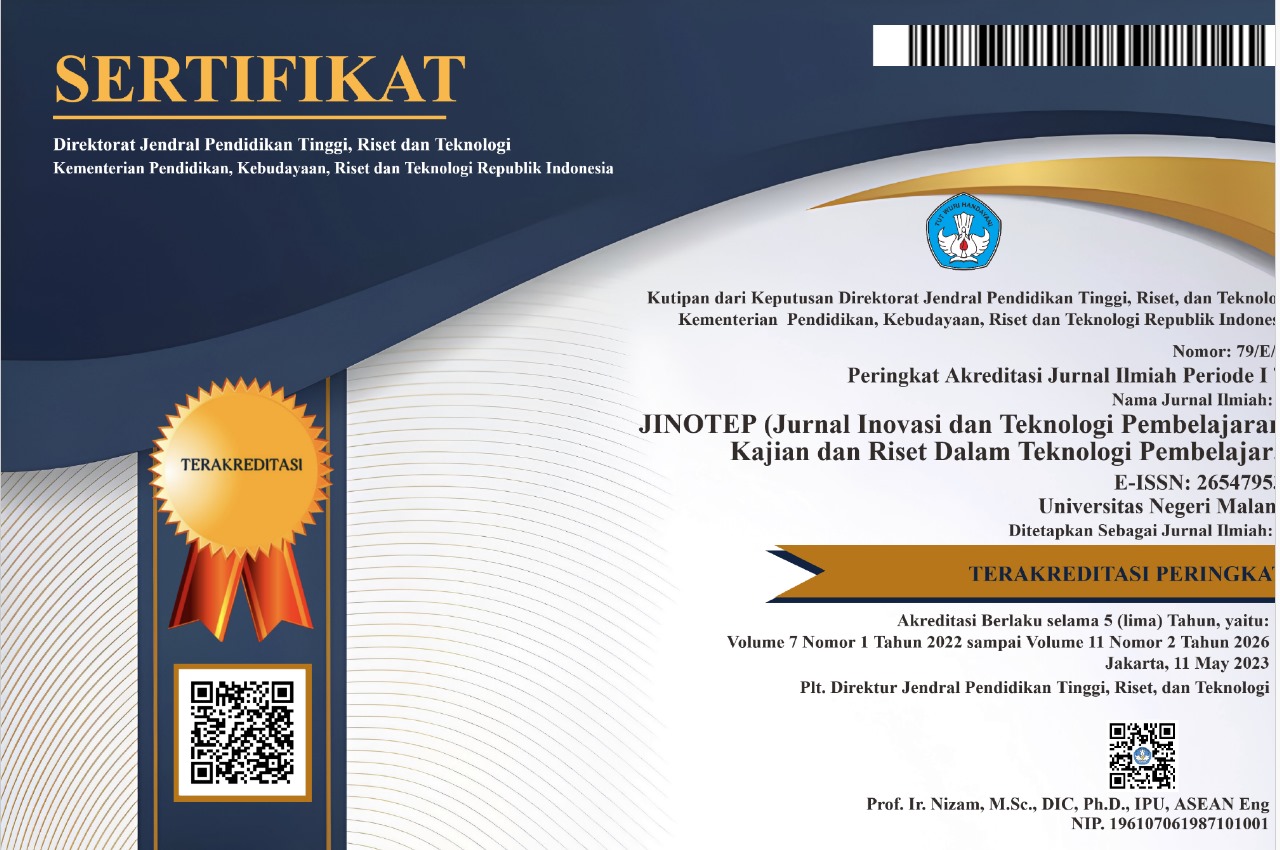Investigating Family and Peer Support on Learning Habits and Achievements in Online Learning
Abstract
Abstrak: Penelitian ini bertujuan untuk menganalisis peranan dukungan keluarga dan teman sebaya pada masa pembelajaran daring terhadap prestasi belajar mahasiswa melalui kebiasaan belajar. Metode yang digunakan dalam penelitian ini adalah kuantitatif dengan jenis eksplanatori dan teknik analisis data menggunakan partial least square (PLS) dengan konstruk reflektif. Sampel yang diambil adalah mahasiswa pendidikan geografi angkatan tahun 2020 dan 2021 Universitas Siliwangi sebanyak 100 orang mahasiswa secara proportional random sampling. Penelitian ini menganalisis hubungan dukungan keluarga dan teman sebaya menjadi variabel eksogen, kebiasaan belajar menjadi variabel mediasi dan prestasi belajar menjadi variabel endogen. Hasil dari penelitian ini ditemukan bahwa dukungan keluarga dan teman sebaya memiliki tingkat pengaruh yang signifikan terhadap kebiasaan belajar, selain itu kebiasaan belajar mempengaruhi prestasi belajar
Abstract: This study aimed to analyze the role of family and peer support during online learning on the students through study habits. The method used in this research is quantitative with explanatory type and data analysis technique using partial least square (PLS) with reflective construct. The samples taken were students of geography education classes of 2020 and 2021 at Siliwangi University, as many as 100 students by proportional random sampling. This study analyzes the relationship between family and peer support as the exogenous variable, learning habits as the mediating variable, and learning achievement as the endogenous variable. The results of this study are that the support of family and peers has a significant level of influence on study habits and that study habits affect learning achievement.
Keywords
Full Text:
PDFReferences
Agustiningtyas, P., & Surjanti, J. (2021). Peranan teman sebaya dan kebiasaan belajar terhadap hasil belajar melalui motivasi belajar di masa Covid-19. Edukatif: Jurnal Ilmu Pendidikan, 3(3), 794–805. https://doi.org/10.31004/edukatif.v3i3.454
Alhafid, A. F., & Nora, D. (2020). Kontribusi dukungan sosial orang tua dan peran teman sebaya terhadap hasil belajar sosiologi siswa kelas X dan XI di SMA Negeri 2 Bengkulu Selatan. Jurnal Sikola: Jurnal Kajian Pendidikan Dan Pembelajaran, 1(4), 284–300. https://doi.org/10.24036/sikola.v1i4.53
Ciputra, W., & Prasetya, W. (2020). Analisis pengaruh e-service quality, perceived value terhadap customer satisfaction, trust, dan customer behavioral intention: survei pada customer toko online www.blibli.com. COMMENTATE: Journal of Communication Management, 1(2), 109–128. https://doi.org/10.37535/103001220201
Cullen, R., Kullman, J., & Wild, C. (2013). Online collaborative learning on an ESL teacher education programme. ELT Journal, 67(4), 425–434. https://doi.org/10.1093/elt/cct032
Djaali, H. (2011). Psikologi pendidikan. Jakarta: PT. Bumi Aksara.
Depeursinge, A., Racoceanu, D., Iavindrasana, J., Cohen, G., Platon, A., Poletti, P.-A., & Müller, H. (2010). Fusing visual and clinical information for lung tissue classification in high-resolution computed tomography. Artificial Intelligence in Medicine, 50(1), 13–21. https://doi.org/10.1016/j.artmed.2010.04.006
DeWert, M. H., Babinski, L. M., & Jones, B. D. (2003). Safe passages: Providing online support to beginning teachers. Journal of Teacher Education, 54(4), 311–320. https://doi.org/10.1177/0022487103255008
Firmansyah, M. F., & Maulana, H. Z. (2021). Empirical study of e-learning on financial literacy and lifestyle: a millenial urban generations cased study. International Journal of Engineering, Science and Information Technology, 1(3), 75–81. https://doi.org/10.52088/ijesty.v1i3.99
Firmansyah, M. F., Maulana, H. Z., Azhari, S. C., & Efendi, M. F. (2022). Pengaruh social media marketing terhadap customer satisfaction pada minat berwisata sub urban kota tasikmalaya: apakah promosi sosial media mengubah minat generasi Z? Journal of Tourism and Creativity, 6(1), 56–65. https://doi.org/10.19184/jtc.v6i1.29156
Firmansyah, M. F., & Nasution, F. Z. (2020). Indeks kepuasan publik bidang pariwisata dan strategi pengembangan pariwisata di Wilayah Priangan Timur. WELFARE: Jurnal Ilmu Ekonomi, 1(2), 118–131. https://doi.org/10.37058/wlfr.v1i2.2143
Hadi, P. (2020). Study from home in the middle of the COVID-19 pandemic analysis of religiosity, teacher, and parents support against academic stress. Talent Development & Excellence, 12(2), 1791-1807.
Ibrahim, I. D. K., Cahyadi, I., Anggriani, R., & Abdurrahman, A. (2020). Pengaruh motivasi dan dukungan keluarga terhadap prestasi belajar mahasiswa selama penggunaan e-learning masa pandemi COVID 19 (studi kasus pada mahasiswa Fakultas Ekonomi dan Bisnis Universitas Bumigora). Target: Jurnal Manajemen Bisnis, 2(2), 265–278. https://doi.org/10.30812/target.v2i2.1016
Jahja, Y. (2011). Psikologi perkembangan. Kencana.
Jones, M., & Ryan, J. (2014). Learning in the practicum: Engaging pre-service teachers in reflective practice in the online space. Asia-Pacific Journal of Teacher Education, 42(2), 132–146. https://doi.org/10.1080/1359866X.2014.892058
Komninou, I. (2018). A case study of the implementation of social models of teaching in e-learning:“the social networks in education”, online course of the inter-orthodox centre of the church of Greece. TechTrends, 62(2), 146–151. https://doi.org/10.1007/s11528-017-0247-4
Martin, F., & Bolliger, D. U. (2018). Engagement matters: Student perceptions on the importance of engagement strategies in the online learning environment. Online Learning, 22(1), 205–222. https://doi.org/10.24059/olj.v22i1.1092
Muir, T., Milthorpe, N., Stone, C., Dyment, J., Freeman, E., & Hopwood, B. (2019). Chronicling engagement: Students’ experience of online learning over time. Distance Education, 40(2), 262–277. https://doi.org/10.1080/01587919.2019.1600367
Ragusa, A. T., & Crampton, A. (2018). Sense of connection, identity and academic success in distance education: Sociologically exploring online learning environments. Rural Society, 27(2), 125–142. https://doi.org/10.1080/10371656.2018.1472914
Reeves, T. D., & Pedulla, J. J. (2011). Predictors of teacher satisfaction with online professional development: evidence from the USA’se‐Learning for Educators initiative. Professional Development in Education, 37(4), 591–611. https://doi.org/10.1080/19415257.2011.553824
Retnowati, F. (2017). Hubungan kebiasaan belajar dan lingkungan sekolah terhadap hasil belajar IPS Kelas V. Joyful Learning Journal, 6(3), 197–205. https://doi.org/10.15294/jlj.v6i3.15027
Rizaldi, D. R., Doyan, A., Fatimah, Z., Zaenudin, M., & Zaini, M. (2021). Strategies to improve teacher ability in using the madrasah e-learning application during the COVID-19 pandemic. International Journal of Engineering, Science and Information Technology, 1(2), 1–6. https://doi.org/10.52088/ijesty.v1i2.47
Rosali, E. S. (2020). Aktifitas pembelajaran daring pada masa pandemi COVID-19 di Jurusan Pendidikan Geografi Universitas Siliwangi Tasikmalaya. Geosee, 1(1), 21-30.
Rusmiyati, F. (2017). Pengaruh kemandirian dan kebiasaan belajar terhadap prestasi belajar metematika siswa kelas x sma negeri 1 rongkop. UNION: Jurnal Ilmiah Pendidikan Matematika, 5(1), 77–86.
Safitri, F., & Yuniwati, C. (2019). Pengaruh motivasi dan dukungan keluarga terhadap prestasi belajar mahasiswa tingkat II Prodi D-III Kebidanan Universitas Ubudiyah Indonesia. Journal of Healthcare Technology and Medicine, 2(2), 154–161. https://doi.org/10.33143/jhtm.v2i2.248
Simamora, L. (2015). Pengaruh persepsi tentang kompetensi pedagogik guru dan kebiasaan belajar siswa terhadap prestasi belajar Matematika. Formatif: Jurnal Ilmiah Pendidikan MIPA, 4(1). https://doi.org/10.30998/formatif.v4i1.136
Sofyan, S. (2014). Pengembangan model pelatihan sistem manajemen mutu berbasis website. JTP-Jurnal Teknologi Pendidikan 16(3), 210-221. https://doi.org/10.21009/jtp.v16i3.5416
Sudjana, N. (2010). Dasar-dasar proses belajar. Bandung: Sinar Baru.
Sugiyono. (2015). Metode penelitian kuantitatif, kualitatif dan R&D. Penerbit Alfabeta.
Syahda, S. (2018). Hubungan dukungan keluarga terhadap kemandirian anak retardasi mental di SDLB Bangkinang Tahun 2016. Jurnal Basicedu, 2(1), 43–48. https://doi.org/10.31004/basicedu.v2i1.25
Wilson, D. (2016). Partnerships for learning: peer group influences on learning outcomes. Journal of Initial Teacher Inquiry, 2, 6–9. https://doi.org/10.26021/817
DOI: http://dx.doi.org/10.17977/um031v9i22022p136
Refbacks
- There are currently no refbacks.
Copyright (c) 2022 Septian Cahya Azhari, Ely Satiyasih Rosali, Muhamad Ferdy Firmansyah, Haikal Zulian Maulana

This work is licensed under a Creative Commons Attribution-ShareAlike 4.0 International License.
======================================================================
Jurnal Inovasi dan Teknologi Pembelajaran published by Universitas Negeri Malang in collaboration with the Asosiasi Program Studi Teknologi Pendidikan Indonesia (APS TPI) and Ikatan Profesi Teknologi Pendidikan Indonesia (IPTPI) with a MoU.
Publisher Address:
Educational Technology Laboratorium, Building D5, 1st Floor
Faculty of Education, Universitas Negeri Malang
Semarang St. No. 5, Malang City, East Java Province, Postal Code 65145
Email: jinotep.fip@um.ac.id
======================================================================

JINOTEP is licensed under a Creative Commons Attribution-ShareAlike 4.0 International License.
JINOTEP Statistics (Since July 13th, 2020)



.png)




.png)
1.png)
1.png)
4.png)
2.png)
1.png)
1.png)
.png)


_3.png)





1.png)
.png)